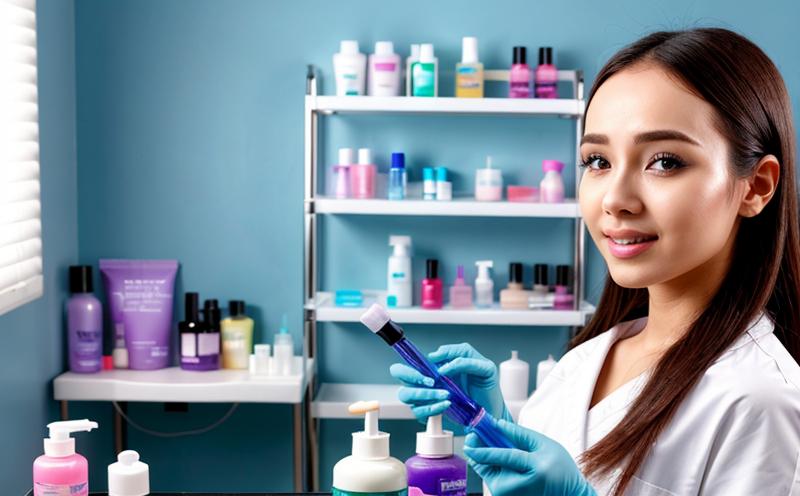EN 13697 Antimicrobial Efficacy Testing in Personal Care Products
The EN 13697 standard outlines the procedure for assessing antimicrobial efficacy in personal care products, which is critical for ensuring product safety and effectiveness. This test method evaluates whether a formulation can inhibit or kill microorganisms that could cause contamination or infection. The standard is particularly relevant for products like shampoos, lotions, soaps, and other hygiene items where antimicrobial properties are marketed.
The testing process involves inoculating the product with various types of bacteria and fungi known to be prevalent in personal care environments. After application of the test formulation, samples are incubated under controlled conditions to observe any changes in microbial populations. The efficacy is measured by comparing the pre-treatment and post-treatment counts of microorganisms.
Quality managers should ensure that their products meet stringent hygiene standards, as consumer safety is paramount. This testing method helps manufacturers comply with regulatory requirements and build trust among consumers who value product purity and effectiveness.
- Benefits:
- Ensures compliance with international standards like EN 13697, thereby reducing legal risks.
- Promotes consumer confidence by demonstrating the safety and efficacy of products.
- Facilitates market entry into regions that require specific testing protocols for hygiene products.
The procedure is intricate, requiring precise control over environmental factors such as temperature, humidity, and time. The results are critical for product development and quality assurance processes. For R&D engineers, this test offers insights into the performance of new formulations. Procurement teams can use these results to source ingredients that meet stringent hygiene standards.
Compliance officers must stay updated on the latest testing methods and regulations to ensure continuous adherence to legal requirements. This test is not only a regulatory necessity but also an important tool for product differentiation in the market. By demonstrating superior antimicrobial efficacy, companies can enhance their brand image and consumer appeal.
Benefits
- Regulatory Compliance: Ensures that the products meet international standards like EN 13697, thereby reducing legal risks and ensuring market access.
- Enhanced Consumer Trust: By demonstrating effective antimicrobial properties, companies can build a strong reputation for product safety and hygiene.
- Market Differentiation: Compliance with this standard sets your products apart from competitors, potentially leading to increased sales and customer loyalty.
- Product Safety: Ensures that the formulation does not inadvertently cause harm or irritation by effectively managing microorganisms.
The benefits extend beyond compliance; they include enhancing brand reputation, increasing consumer trust, and differentiating products in a crowded market. These advantages are crucial for maintaining competitive advantage in the personal care sector.
Why Choose This Test
The EN 13697 test is essential for manufacturers looking to ensure that their personal care products meet stringent hygiene standards and regulatory requirements. The testing process involves inoculating the product with various types of bacteria and fungi, then incubating the samples under controlled conditions to observe any changes in microbial populations.
- Compliance: Ensures compliance with international standards like EN 13697, thereby reducing legal risks and ensuring market access.
- Innovation: Provides insights into product performance that can drive innovation and improve formulation design.
- Quality Assurance: Offers a rigorous method to assess the effectiveness of antimicrobial properties in products.
The test is particularly valuable for companies focused on hygiene and safety, as it ensures that their products meet the highest standards. By choosing this test, manufacturers can demonstrate their commitment to consumer health and well-being, thereby enhancing brand reputation and trust.
Competitive Advantage and Market Impact
The EN 13697 test plays a pivotal role in differentiating personal care products in the market. By ensuring that antimicrobial properties are effective, companies can enhance their product’s safety profile, which is increasingly important for consumers who demand hygienic products.
- Enhanced Reputation: Compliance with this standard enhances brand reputation and builds consumer trust, leading to increased loyalty and repeat purchases.
- Innovation Leadership: The insights gained from the test can drive product development, allowing companies to stay ahead of competitors by offering superior products.
- Market Access: Meeting stringent hygiene standards like EN 13697 opens doors to international markets that have strict regulations on personal care items.
The market impact of this test is significant. It not only ensures compliance but also sets a benchmark for quality and safety, making it an essential tool for companies seeking to establish themselves as leaders in the hygiene sector. The ability to demonstrate effective antimicrobial efficacy can be a decisive factor in winning consumer preferences.





